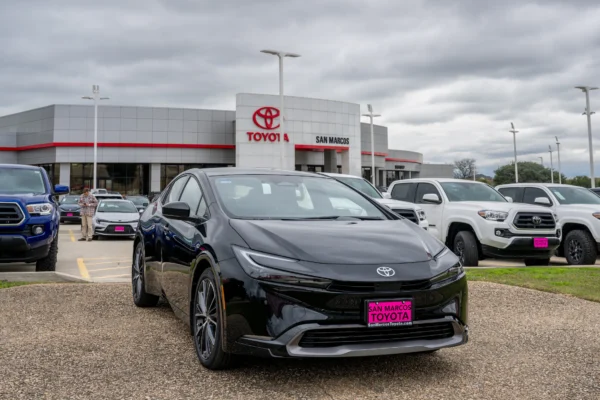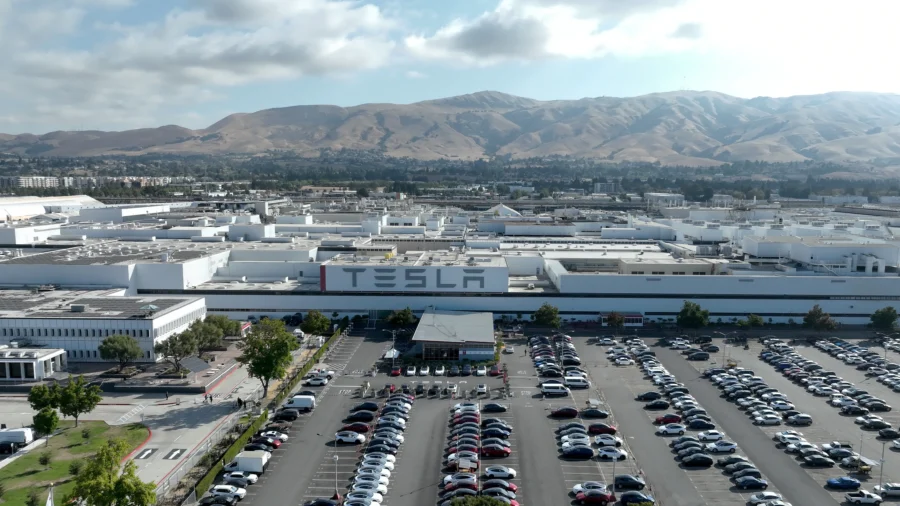A survey showed that the number of people considering to buy a Tesla car has dropped, and overall, the popularity of electric vehicles (EVs) has slowed down.
Market intelligence firm Caliber said that Tesla Inc.’s “consideration score” fell to 31 percent in February, less than half its high of 70 percent in November 2021 when it started tracking consumer interest in the brand.
According to its data, the big fall for Tesla happened between November 2021 and January 2022, three months before Tesla CEO Elon Musk initiated his acquisition efforts for social media company Twitter.
Mr. Musk’s electric car company reported it delivered only 387,000 vehicles, down from the 484,507 cars it delivered in the final three months of 2023.
The fall in Tesla’s popularity happened at the same time when Caliber’s consideration score for Mercedes, BMW, and Audi increased.
Tesla’s global sales were off nearly 9 percent, which the company said was partially the result of factory changes to build an updated Model 3, shipping delays in the Red Sea, and an attack that knocked out power to its factory in Germany.
EV sales grew only 3 percent to 268,000 in the year’s first quarter, far below the 47 percent growth last year, which had given them an 8 percent market share.
Tesla’s diminishing sales led that fall.
Edmunds Director of Insights Ivan Drury said that several other concerns “about charging infrastructure, battery life, insurance costs” contributed to the lessening popularity of EVs.
New car registrations for Teslas in California—their biggest market in the U.S.— posted their first drop in over three years in the fourth quarter of 2023, even as EV sales rose overall.
At least five analysts cut Tesla’s target price last month, saying the automaker could post disappointing first-quarter delivery results. Tesla shares are down nearly 30 percent year to date.
Mr. Musk promoted Tesla as a way to tackle climate change by reimagining cars as stylish, electric computers on wheels that could beat gasoline guzzlers in looks, performance, and handling.
However, the pollution costs of creating the car batteries were rarely covered.
Tesla has achieved breakneck annual sales growth for more than a decade.
According to market research firm S&P Mobility, Tesla is a brand with high customer loyalty. 68 percent of owners chose another Tesla when they bought a new car last year.

New Vehicle Sales Rose
In the United States, new vehicle sales rose 5 percent in the January-March period this year despite high-interest rates.
In the first quarter, 3.8 million vehicles were sold in the country, and 15.4 million sales were recorded in a year.
The average price for a car is $44,000, down 3.6 percent from a year ago.
Cox Automotive chief economist Jonathan Smoke agreed that high-interest rates had a role in the poorer sales.
“Interest rates are still near 24-year highs, and consumers just don’t have the urgency to buy, with the expectation that rates will be lower later this year,” he wrote in a market report. Automobile interest rates still are averaging around 7 percent per year.
Edmunds’s director of insight, Ivan Drury, said vehicles that are more affordable are selling faster than more expensive ones. Sales of many large and expensive SUVs fell during the quarter as companies faced more frugal buyers.
“Small sells, whether it be size or the sales price,” Mr. Drury said.
For example, General Motors’ Chevrolet brand sold 37,588 Trax small SUVs in the quarter, more than a fivefold increase from a year ago. By itself, the Trax, which starts around $21,500, outsold the entire Cadillac brand.
Most automakers reported strong year-over-year sales increases from January through March, but General Motors, Stellantis, Kia, and Tesla reported declines.
GM, the top-selling automaker in the U.S., reported that sales were down 1.5 percent for the quarter, while Stellantis sales were off nearly 10 percent. Kia sales were down 2.5 percent. All three companies reported strong first-quarter sales a year ago.
Toyota is an exception and reported a large sales increase, 20 percent, for the quarter. Honda said its sales increased 17 percent, while Nissan and Subaru both posted 7 percent increases. Hyundai reported an increase of just 0.2 percent.
Reuters and The Associated Press contributed to this report.

